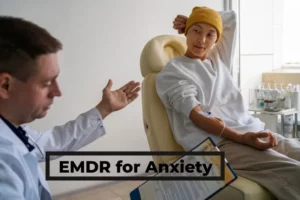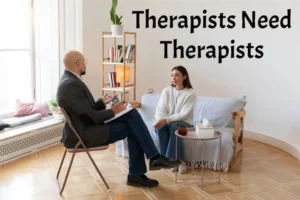Introduction
We have all seen movies and series with support groups and group therapy sessions. The sitcom ‘Mom’ is based on the premise of the Alcoholics Anonymous group, and the TV series ‘Anger Management’ shows Charlie Sheen leading group sessions for anger management. Even beyond that, support groups and therapy groups are popular subjects in the media. Outside of the media too, group therapy is a wonderful space which provides people with a unique platform to address their concerns and find support from others facing similar challenges. Group therapy is dynamic and collaborative and builds a sense of community for people. It also allows you to share your experiences and gain insights with a group you can trust. This article delves into everything you need to know about group therapy.
What is Group Therapy?
Group therapy is a form of intervention where a small group of individuals (usually 6 to 12 participants) meet under the guidance of a trained therapist. All these participants have something in common, which is usually the issue they wish to address. For instance, a group that meets to manage PTSD will only have individuals diagnosed with PTSD. This is a major strength of group therapy for it brings in the participants a feeling of universality. That is, they realize that they are not alone and others are also going through the same problems [1].
Clinicians use the process of group therapy for several conditions, such as PTSD, anxiety, depression, trauma, etc. The aim of group therapy is to help people manage their issues in the group and eventually learn to manage their symptoms outside of the group as well. Participants devote time to things like learning coping skills, correcting their behaviour, and developing relationship skills with the idea that they will be able to return to normal functioning within society [1].
Learn to know more- A quick guide to deal with Anxiety
There are numerous benefits of group therapy apart from the community it builds. Majorly, group therapy is cost-effective, reduces wait time, and increases accessibility in areas where the number of therapists is limited [1]. It also builds for clients social support as they are able to find people who understand them.
What are the Benefits of Group Therapy Sessions?
Joining group therapy can benefit you in a lot of ways. Here is the rundown of some of these benefits [2] [3] [4]:

- Finding Similar Other: When you enter group therapy, you meet other individuals who are on a path to recovery or dealing with problems similar to yours. Sometimes, just knowing that someone understands your struggle is enough to make you feel less lonely and less alienated.
- A Space of Support: In individual therapy, you find some support from the therapist. However, they often talk about how the space is for healing and growing and that you need to develop a support system outside therapy. In group therapy, however, you get both the therapist and a support system. Not only that, you also become a part of someone else’s support system, which can bring validation and meaning for yourself.
- Connecting with Self and Other: This is a space where you can discover your authentic voice, say what you have been reflecting on, and feel free to share your emotions without embarrassment. At times, sharing and listening to others can generate insights for you, and you also get to know about your ability to connect with others.
- A Space for Skill Development: In this setting, you can work on your social skills, coping skills, anger management skills, emotional regulation skills, etc. The skills you work on will depend on the group’s goal, but you can acquire and practice them in a safe and supportive environment.
- A Cost-Effective Means of Healing: Compared to individual therapy, group therapy is cheaper. If you have been struggling with financial constraints, you can opt for this version of support instead of committing to one-to-one sessions.
Read about – Parenting trauma for ADHD
What to Expect in a Group Therapy Session?

Like any other therapy process, entering group therapy for the first time can be scary. But when you know what to expect, it helps in easing the process of settling in. Here are some common things you can expect in group therapy [2] [5]:
- Confidentiality: Therapy cannot work without trust and confidentiality. When you enter this setting, chances are the lead psychologist will talk about setting ground rules, and one of them will be confidentiality. It means that you and everyone else in the group will respect each other’s privacy and not share what you discuss with people outside. Even if you share content, you will keep the identity of the person hidden or take the person’s consent before sharing.
- Active Participation: The setting will also expect you to be an active participant and share your feelings, thoughts, and experiences openly. At times leaders also conduct activities to enhance insight and promote communication. If the therapist conducts such activities, you will be expected to take part in it or share your discomfort around it.
- Group Dynamics: The group therapist’s role is to facilitate the sessions in a manner that everyone is heard and hears others. No one takes the spotlight, and everyone gets along without conflict. The therapist will use techniques like empathizing, facilitating, summarizing, clarifying, etc, to lead the group toward a space of healing and reflection.
More information about- Online Counselling
What Is The Difference Between Group Therapy Sessions And Individual Therapy?
Many of you may be wondering which is better, group or individual therapy. The answer to that is: it depends. It depends on the person, situation and the goal of therapy. Both forms can be effective, and both share the goal of promoting helping people, but there are some major differences between them. These differences include [6] [7] [8]:
- The Focus of the Therapy: Individual therapy’s focus is on a single client and their specific needs. The therapist focuses only on this person, and the sessions try to address this individual’s unique challenges. However, in a group, the whole group has a collective goal and needs. The therapist is then tasked with paying equal attention to each person but ensuring that the group’s goals and needs are met and no single person takes over.
- Support System: The support system is very different in both settings. In individual therapy, the only support system a client has is with the therapist. However, in group therapy, this support is greater because participants gain support not only from the therapist but also from fellow group members. The group becomes an additional source of guidance. Many individuals consider this to be the biggest strength of this process.
- Diversity of Perspectives: In group therapy, you interact with individuals from various backgrounds. This enriches the therapeutic experience as you get very diverse perspectives and insights.
- Cost and Scheduling: Group therapy tends to be cheaper than one-on-one sessions. However, there is less flexibility in scheduling and setting sessions as the entire group’s availability has to be accounted for.
Read more about – Anger management program
Conclusion
Group therapy is a unique approach to therapy where people who have been going through the same issues meet and seek help at the same time. Its community-like makeup makes it a much more supportive environment, and people learn from others like them. You feel accepted, validated, and seen by all members of your group during this process. There are many benefits of group therapy, but ultimately, it is up to you to decide whether this is something you wish to seek or not.
United We Care is a mental health platform dedicated to the overall well-being of individuals worldwide. If you seek support and mental health help, contact United We Care’s experts. Our team aims to provide the best solution for your needs.
References
- A. Malhotra and J. Baker, “Group therapy – statpearls – NCBI bookshelf,” National Library of Medicine, https://www.ncbi.nlm.nih.gov/books/NBK549812/ (accessed Jul. 4, 2023).
- J. Eske, “Group therapy: Definition, benefits, what to expect, and more,” Medical News Today, https://www.medicalnewstoday.com/articles/group-therapy (accessed Jul. 4, 2023).
- M. Tartakovsky, 5 benefits of group therapy – West Chester University, https://www.wcupa.edu/_services/counselingCenter/documents/groupTherapyBenefits.pdf (accessed Jul. 4, 2023).
- Mse. Kendra Cherry, “How group therapy works,” Verywell Mind, https://www.verywellmind.com/what-is-group-therapy-2795760 (accessed Jul. 4, 2023).
- C. Steckl, “What happens during group therapy?,” MentalHelp.net, https://www.mentalhelp.net/blogs/what-happens-during-group-therapy/ (accessed Jul. 4, 2023).
- Y. M. Yusop, Z. N. Zainudin, and W. M. Wan Jaafar, “THE EFFECTS OF GROUP COUNSELLING,” Journal of Critical Reviews, 2020. Accessed: 2023. [Online]. Available: https://oarep.usim.edu.my/jspui/bitstream/123456789/11378/1/The%20Effects%20Of%20Group%20Counselling.pdf
- C. McRoberts, G. M. Burlingame, and M. J. Hoag, “Comparative efficacy of individual and group psychotherapy: A meta-analytic perspective.,” Group Dynamics: Theory, Research, and Practice, vol. 2, no. 2, pp. 101–117, 1998. doi:10.1037/1089-2699.2.2.101
- “The differences between individual vs. group therapy: Oxford,” Oxford Treatment Center, https://oxfordtreatment.com/addiction-treatment/therapy/individual-vs-group/ (accessed Jul. 4, 2023).










